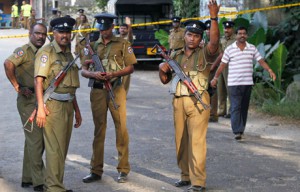After three decades of war with a local terrorist group, the island nation was beginning to enjoy peace and normalcy when the Syrian crisis erupted drawing some Sri Lankan Muslim youth to the conflict zone. Colombo responded quickly by joining hands with civil and religious groups to educate people about the danger of joining extremists groups like the Islamic State
The Sri Lankan government is taking steps to prevent the entry of Islamic State (IS) militants to the island nation amid threat of their infiltration across Asia.
The country, which was once home to the terrorist organization Liberation Tigers of Tamil Eelam (LTTE), has been on alert after 37-year-old Abu Shuraih Sailania, a local karate instructor who joined IS, was reportedly killed in an airstrike in Syria in July 2015.
Since then, Colombo, with the help of political and religious leaders, has been persuading local Muslims against joining extremist groups like the IS. Thanks to its initiative, schools are educating children about the dangers of joining terror groups.
Law and Order Minister Sagala Ratnayaka recently assured Parliament that steps are being taken to prevent foreign terrorist groups from using the country as a breeding ground. Special screening is done by immigration and emigration authorities to identify possible extremists who may try to enter the country. The move comes after defense secretary Karunasena Hettiarachchi said some of the 36 Sri Lankans who went to Syria had joined IS.
“They said they were going on pilgrimage, but I believe some of them had joined the IS,” Hettiarachchi said in January.
Hilmy Ahamed, vice president of the Muslim Council of Sri Lanka (MCSL), wants the government to engage the Muslim community.
“The government should be on the alert and engage the Muslim community if it has any evidence of such (terrorist) activity so that it could be nipped in the bud,” he told Asia Times.
“But the government has not provided such evidence to back these claims,” he said, adding that such claims are being spread on social media by individuals for propaganda.
Radical groups with vested interests are causing fear psychosis in people by claiming IS are active in the country after Sailania’s death.
“Buddhist fundamentalists and, more importantly, others with vested interests to destabilize the Muslim community have planted stories of IS infiltration in Sri Lanka. There is absolutely no evidence of any such threat,” Ahamed said.
“Muslim civil and religious leadership including the All Ceylon Jamiyyathul Ulama, the apex religious body of Islamic Theologians, and the Muslim Council have, long before Sailania’s death, condemned IS as non-Islamic and alerted the community on the possible threats by fundamentalists who may pose as religious freedom fighters. They have also engaged the government and enlightened Muslims through Friday sermons on the threat of IS infiltration,” he said.
“Muslims have offered to intervene if ever there was a threat of IS to Sri Lanka. So I do not believe IS will be able to get a footing in Sri Lanka,” he said.
Meanwhile, police media spokesman Ruwan Gunasekera has assured that police and military officials are on alert and are keeping a close watch on all terrorist groups, not just IS, to ensure that the country does not face any threat from such groups and it does not become a breeding ground for them.
atimes.com/



